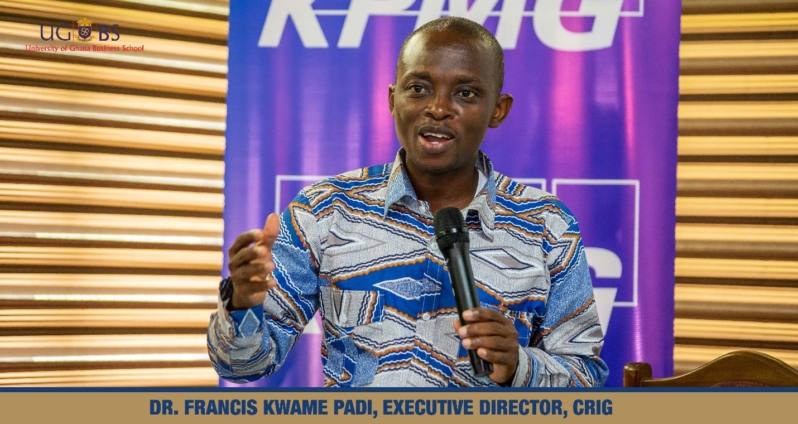The Executive Commitee of the Alumni Association of the University of Ghana Business School (UGBS) in partnership with KPMG Ghana celebrated this years “National Chocolate Day” which fell on February 14, 2023 with farmers Akim Tafo, a cocoa growing Community in the Eastern region of Ghana.
This was a follow up to association’s maiden Chocolate celebrations with farmers at Kwahu Bepong in 2019.
The “National Chocolate Day” was initiated by the Ministry of Tourism, Arts, and Culture in association with the Ghana Tourism Authority in 2005 and has since become a household name in Ghana.
The “National Chocolate Day” is further aimed at encouraging the consumption of chocolate, promoting domestic tourism among Ghanaians, and shifting the youth's attention from amorous relationships towards showcasing love to their loved ones through the gift of chocolate.
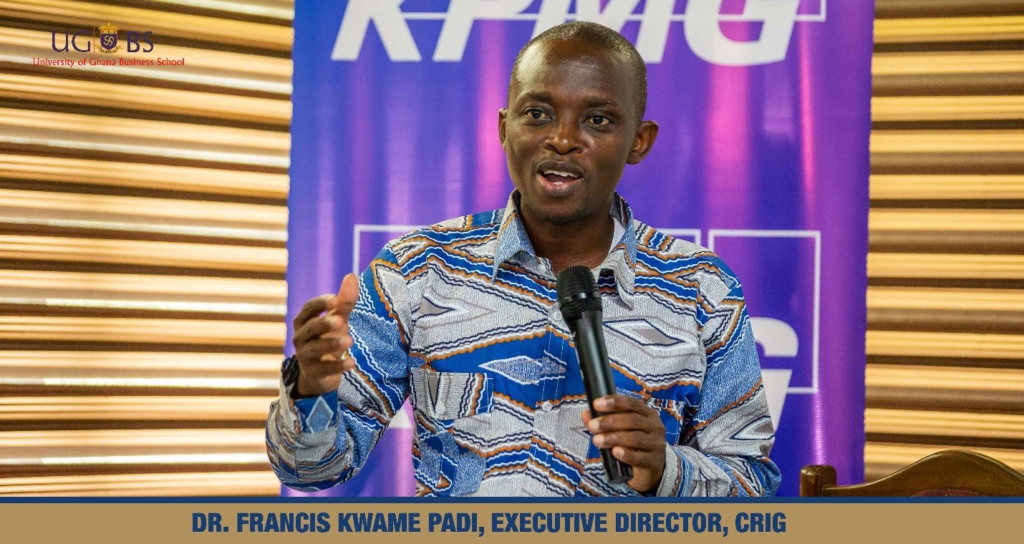
The UGBS team began the event with a trip to the Cocoa Research Institute of Ghana (CRIG).
Welcoming the delegation, the Executive Director of CRIG, Dr. Francis Kwame Padi, expressed his delight at the visit and introduced his management team.
In his introductory remarks, Dr. Kwaku Ofosu-Asare, President of the UGBS Alumni Association indicated that the Executives of the Alumni Association upon assuming office instituted a policy that the Chocolate Day celebrations should be about the farmers who toil to produce the cocoa and not about celebrations in the urban cities. "
In celebrating Chocolate Day, the best people to deal with are the farmers,” he added. He further indicated that the programme was halted because of the Covid-19 pandemic but has now been reactivated.
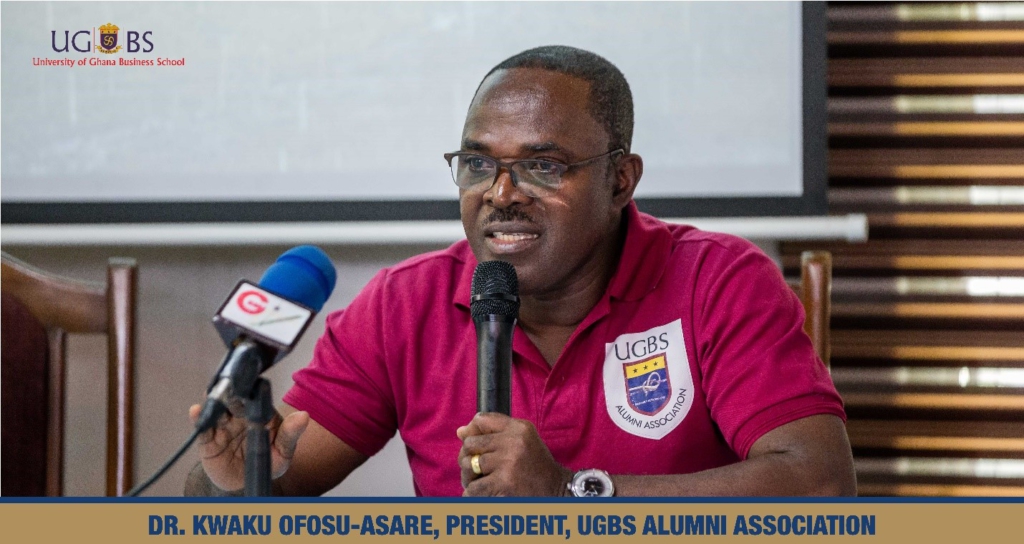
Giving more highlights, Dr. Kwaku Ofosu-Asare disclosed that the visit to CRIG was through the efforts of Nana Dr. Michael Agyekum Addo, Nkabomhene (Chief of Unity) of the New Juaben Traditional Area who is also an alumnus. Emphasizing further on the purpose of the visit, Dr. Ofosu-Asare indicated that their mission was to interact with, share ideas on the illegal mining (galamsey) menace as well as share chocolate with the farmers.
Subsequently, the UGBS team was taken on a tour of the Institute beginning from the library. The team then moved to CIRG’s demonstration cocoa farm where the Executive Director pointed out that cocoa is the only tree that is maintains the ecosystem of nature.
He explained further a cocoa farm still needs to maintain the virgin primary trees, the secondary trees as foliage and requires other flora and fauna species unlike other farming activities that require total clearance of vegetation.
On a visit to the Institute's laboratory known as the "Flavour Lab, Stephen Opoku, the laboratory scientist highlighted the various processes that cocoa beans are taken through before being exported.
He also gave details about the various fermentation process used at the lab to test the quality of the beans.
He further indicated that Ghana's cocoa is considered one of the best hence it is used as a blend by all cocoa processors.
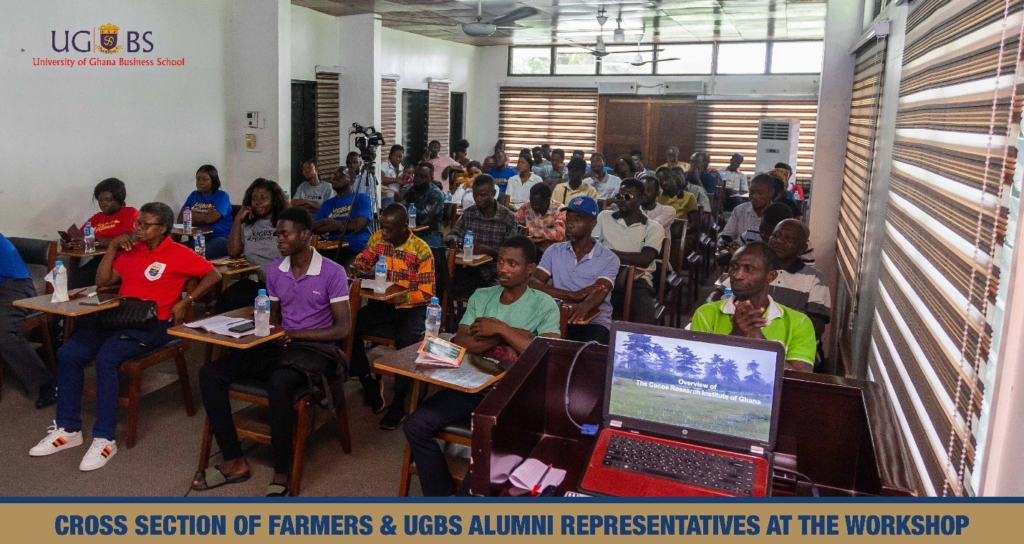
Addressing some invited farmers from the Akim Tafo area at a workshop, the Alumni President reiterated the fact that cocoa farmers should be at the centre of celebrations since it is their toil that brings out the chocolate, we all enjoy.
Giving further explanation on the purpose of the workshop, Dr. Ofosu-Asare added that the meeting was to share ideas, get to know their challenges, visit their farmers, share chocolate with them, and also ideas about business opportunities from the cocoa value chain.
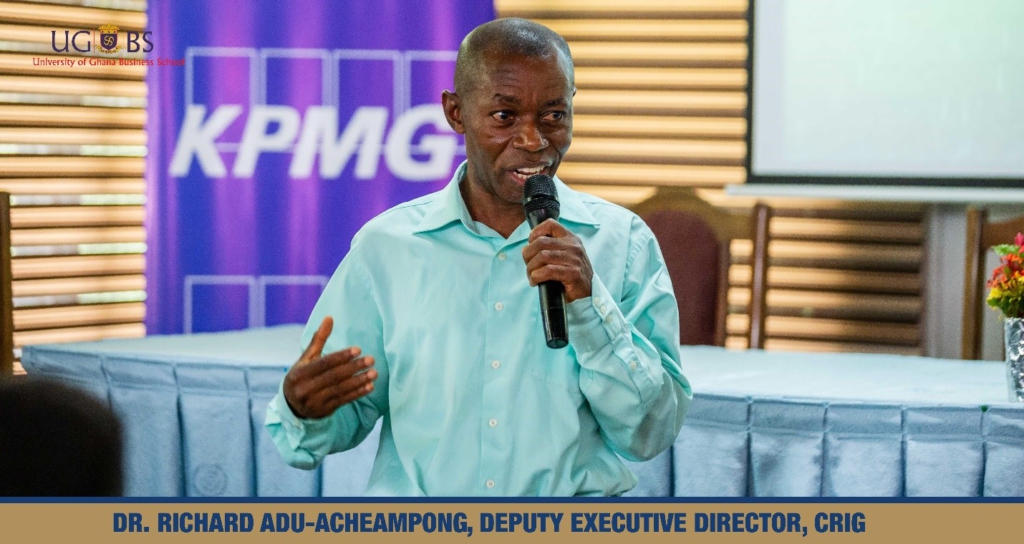
Giving a historical background of CRIG, Dr. Richard Adu-Acheampong, Deputy Executive Director (Cocoa & Kola) highlighted the objective of the setting up of CRIG.
He further clarified that the advent of swollen shoot virus culminated in the need for further research into diseases that affect cocoa hence CRIG was established.
He further gave an account of the various interventions that were used historically as a treatment for the cocoa plants disease such as the use of kerosine, DDT, and many others but with the advent of technology, more effective agrochemicals are now used.
He also mentioned the numerous corrupt practices that the farmers and traders have used in selling out insecticides and fertilizers and called for their cessation.
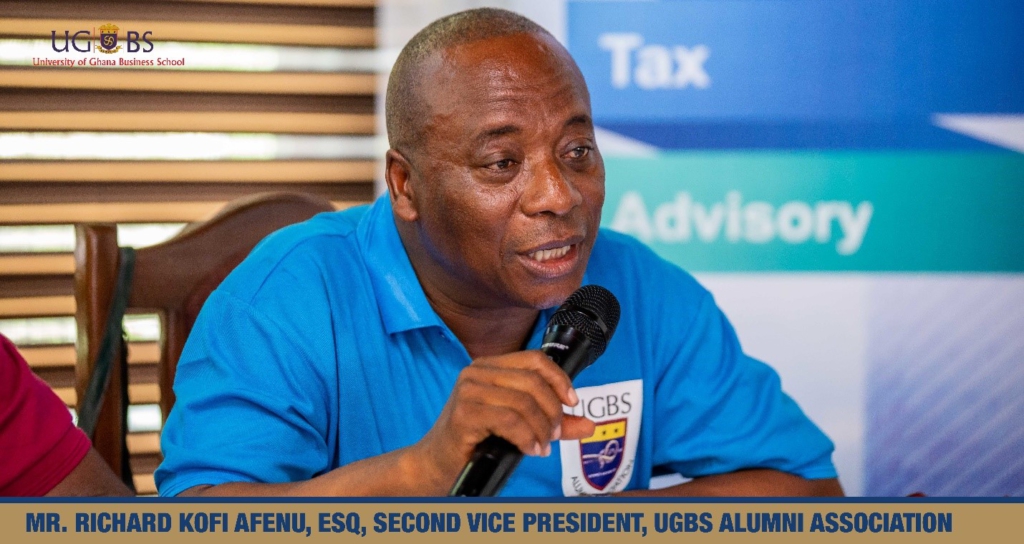
Delivering a talk on the topic “Are Cocoa Farmers Safe from Galamsey or small scale Mining Activities," Richard Kofi Afenu Esq., the 2nd Vice President of the Alumni Association posited that illegal mining has become so endemic due to
- Perceived complexity of mineral licensing process.
- Greed and ‘get-wealth-quick’ mentality;
- Alternative Livelihood Projects not being attractive relative to quick returns from small scale mining
- Connivance of some chiefs, landowners and opinion leaders with illegal miners to mine minerals even in restricted areas.
- Ghanaians fronting for foreigners to operate in the small scale mining sub sector;
- Political interference and corruption.
He further mentioned that the galamsey menace has been heightened because of foreigners are aided by Ghanaians as well as politicians leading to the destruction of water bodies and cocoa farms. The use of mercury has particularly been of concern as it poses health hazards to humans if they indeed enter the food chain.
Giving more emphasis on the galamsey menace, Mr. Afenu indicated that a total of 19,000 hectares of cocoa farmlands have been destroyed due to illegal mining activities leading to loss of income to the farmers and the country as a whole.
Destruction of cocoa farms through galamsey was pronounced in the Eastern, Western and Ashanti regions, from where more than 90% of the country’s total cocoa production comes.
He emphasised that these illegal destruction threatened the sustainability of the cocoa sector, which generated an average of $2.5 billion in foreign exchange every year, as well as its associated multi-billion cedi cocoa processing sub-sector and more than 800,000 jobs.
He suggested that as interim solution to the solving the problem, COCOBOD and the Minerals Commission to share information on location of cocoa farms across the country to enable the Minerals Commission to stop licensing such areas for mining activities. He cited the example of GOPDC where areas of oil palm plantations where plotted at the Minerals Commission as no-go areas. He also suggested that
- Security Agencies should arrest and prosecute illegal miners that destroy cocoa farms,
- COCOBOD should sanction owners of farms who are beneficiaries of free cocoa seedlings that are destroyed by illegal miners.
- Education of farmers on long term financial security of cocoa farms as opposed to short-time and unsustainable revenues from illegal mining.
- Delineate mineable areas and block them for small scale mining to limit hit and run approach by miners.
- Abolish Community Mining Scheme Concept which is not grounded in law but gives false impression to the communities that they have been authorized to mine.
In conclusion, he stated that the war against illegal mining is a collective responsibility and local government structures have active roles to play. Illegal mining is now more of a security issue than a social issue.
He further advised that DCEs and MCEs who are heads of DISEC AND MUSEC respectively should be held responsible for any illegal mining activity within their jurisdictions. A galamsay-free district or municipal should be a major consideration in the assessment criteria for the performance of DCEs and MCEs.
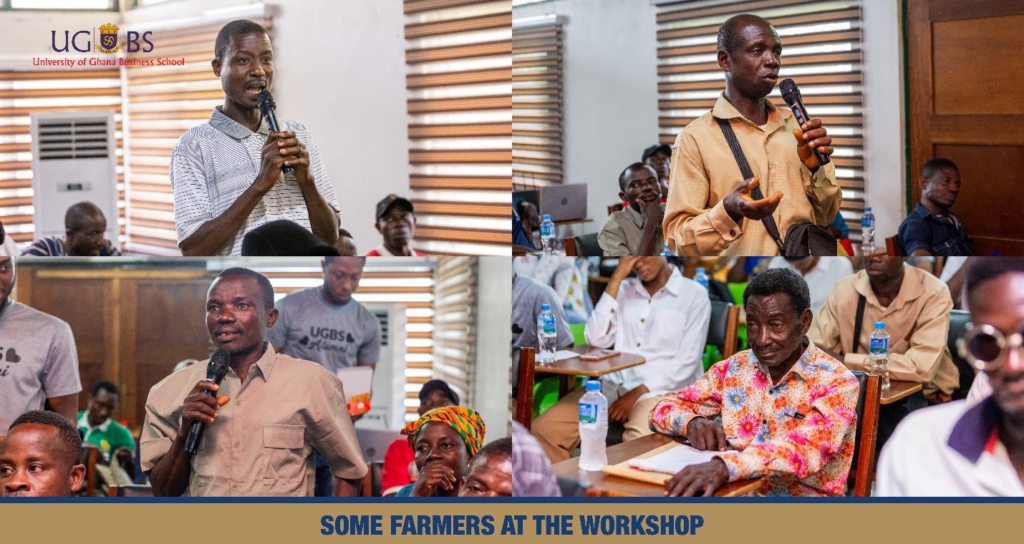
Outlining their challenges, some of the farmers hinted that some of their landowners are opting for galamsey instead of using their lands for cocoa farming. They also bemoaned the high cost of agro-inputs while the producer price of cocoa remains the same. The farmers also expressed regret about not getting any revenue from all the by-products of cocoa.
Responding to the farmers, Dr. Richard Adu-Acheampong, the Deputy Executive Director indicated that together with the Alumni Association, a policy brief will be drafted and forwarded to the appropriate authorities for action.
He further admonished the farmers to work as cooperatives to enable them to bargain for better prices for their agro-inputs.
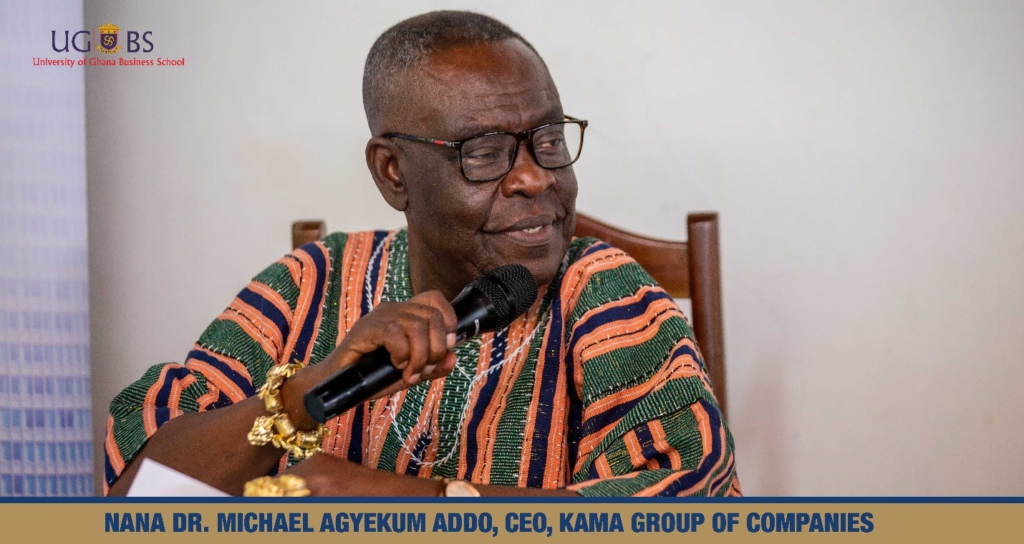
Making brief remarks, Nana Dr. Michael Agyekum Addo informed the farmers of a private company that buys the cocoa husk. He further encouraged the farmers to have a united front to fight anyone who would want to take over their lands for galamsey.
Latest Stories
-
Kwame Yesu’s latest project blends raw emotion with rap precision
43 minutes -
Court remands Mobile Money robbery suspect into police custody
2 hours -
BIDEC and Ghana Dance Association engages Ghana Tourism Authority on dance tourism
2 hours -
Ghana pushes forward with National AI policy through multi-stakeholder engagement
2 hours -
Mahama pays tribute to late Pope Francis
2 hours -
W/R police clamp down on crime: Suspects arrested for vehicle theft, gold robbery, galamsey
2 hours -
This Saturday on Newsfile: Chief Justice suspension and galamsey take centre stage
3 hours -
GIMPA GRASAG inaugurates study rooms, business centre to support academic work
3 hours -
Be circumspect with selection of new investors for Damang Mine – ACEP to government
3 hours -
Chieftaincy Institution in Ghana at a Crossroads – A Perspective by Andrews Kofi Anokye (KOANS)
4 hours -
Offinso highway robbery: Police mount hunt for killers of bus conductor
4 hours -
‘We will fish him out’ – DCOP Teye-Cudjoe vows to arrest soldier behind Nyinahin shooting
4 hours -
Traditional leaders laud AngloGold Ashanti’s youth dev’t initiatives in Obuasi
4 hours -
Cyra Pamela Koranteng resigns as Judicial Secretary, deputy elevated
4 hours -
Benjamin Arthur hands over as Chief Executive of Fair Wages
5 hours

